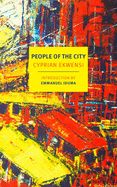
Introduced in the U.K. in 1954, Ekwensi's debut novel, People of the City, arrives on U.S. shelves in a handsome new edition. Despite the book's age, the perennial everyman narrative proves equally affecting for contemporary audiences: Ekwensi's (anti-)hero distances himself from his provincial background ambitiously to pursue the rewards of a quickly changing urban life.
Amusa Sango is "a most colourful and eligible young bachelor" who lives, works, plays--and too easily loves--in a "famous West African city (which shall be nameless)" not unlike Lagos. Although he diligently works two jobs, as a crime reporter for a city paper and a dance-band leader at a club, he is rarely solvent. As an only son, what little he earns must also be shared with his widowed mother. While chasing stories of violent deaths and seeking opportunities to make music, Sango's careless choices in companionship do not serve him well. One friend's dangerous shenanigans first get Sango evicted from his modest lodgings, and later cause a detrimental impact to his journalism career. He's long been engaged to a naïve fiancée sequestered in a rural convent, who remains unaware of his reckless affairs. True love eventually catches him off-guard, but a happy ending is hardly guaranteed.
In an introduction both personally revealing and contextually enlightening, Nigerian author, editor and art critic Emmanuel Iduma (A Stranger's Pose) restores Ekwensi's historical literary prominence and underscores Ekwensi's crucial legacy as a progenitor to "any Nigerian writer who has tried to write about Lagos as a city with feeling," including Sefi Atta, Teju Cole and Chris Abani. --Terry Hong, Smithsonian BookDragon

